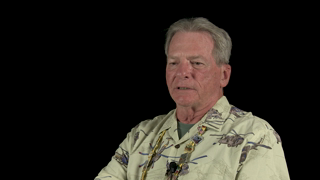6:14 | The hardest part of helicopter flight school is learning how to hover. Mike Waugh finally mastered it when his instructor uttered an expletive. After his training, he had to take a non-flying assignment as he waited for a likely return to Vietnam. It was good duty because he got to participate in the testing of new technology.
Keywords : Mike Waugh Vietnam helicopter pilot Fort Wolters Fort Rucker Minigun engine failure Fort Hood artillery 155 mm 1st Cavalry 105 mm laser Forward Observer (FO) Lam Son 719

His father was career Army, sent to Saigon in 1954 as part of the initial effort to aid the South Vietnamese after the French withdrew. Mike Waugh noticed as the war heated up all through his college years and when he took an ROTC commission after graduation, he knew he would be going. He got his first choice of assignments, the 101st Airborne at Fort Campbell.
Mike Waugh came into Vietnam as a replacement, like so many others. Assigned to an artillery battery as a forward observer, he was immediately sent to assist a MIKE Strike Force, which was Special Forces and Montagnard militia. The enemy never materialized and he learned how the elite troops overcame boredom in the field.
On his thirty day foray into the field with the Special Forces, Mike Waugh thought he would be in a hot area, but it was quiet. The Montagnards on the operation supplemented the C-rations with some delicious food and, when they returned to Pleiku, he was invited to dinner with their commander.
Mike Waugh rotated through nearly every job for a Lieutenant in the artillery unit. At one point, his battery was split and he took three guns to a a nearby spot called LZ Pony. Halfway through his tour, he was moved to battalion headquarters, where he was responsible for the firing of many batteries.
He did not experience anything negative on his return from his first tour of Vietnam. In fact, when he went to see his fiance, every home on the street had an American flag out for him. Unfortunately, his next assignment was not to his liking, so he applied for flight school, which had always been a desire.
His first Vietnam tour was like a romantic adventure, a young man off doing macho stuff. When he left for his second tour, he had a wife and a child, so it was quite different. This time he was a helicopter pilot and a captain, although he deferred to lower ranking pilots who were more experienced. Now he would really learn to fly by picking up on and perfecting the things they can't teach you in flight school.
When he returned to Vietnam, helicopter pilot Mike Waugh was working solely with South Vietnamese troops. On one operation, he flew over an enemy force that was poised to ambush truck traffic and his helicopter was hit. He had to put it down, but it was in a safe area. He realized that everyone was looking at him funny and, once he got his helmet off, he found out why.
Mike Waugh's unit stood down while he was in Vietnam and the personnel were dispersed across the country, although the American presence was shrinking quickly. For his last mission, he had to fly a stripped down aircraft to a transhipment point, a mission that, oddly, he considered his most dangerous.
He surprised his wife after returning from his second Vietnam tour, but then his dog surprised him. Mike Waugh had planned to make the Army a career, but it didn't work out, so he was worried about what he would do. He mailed out resumes and got one reply.
It was the defining moment of his life. Mike Waugh was a helicopter pilot in Vietnam and he has some insightful observations on the way the war was fought, the reasons it was fought that way, and the legacy it holds today.